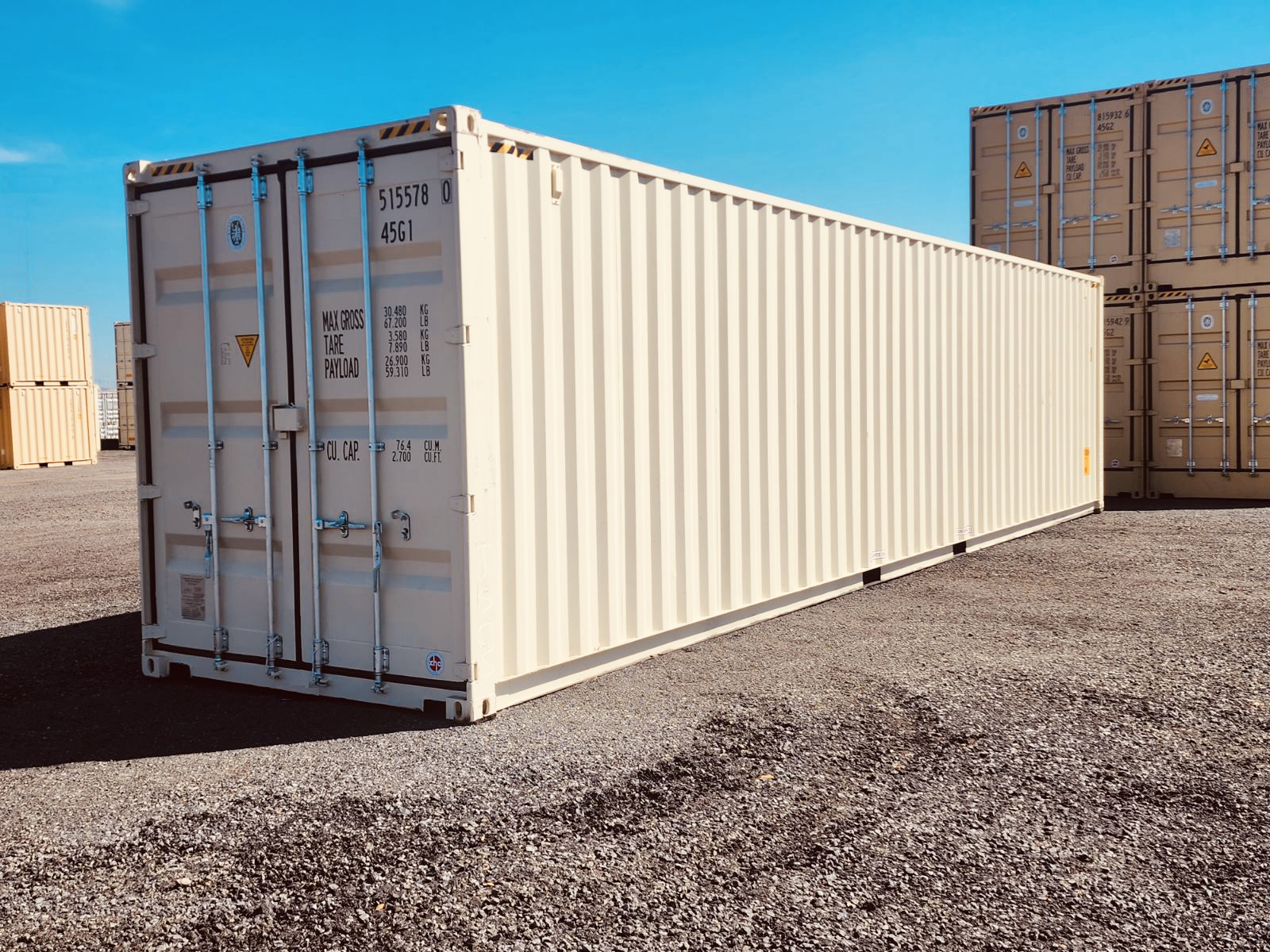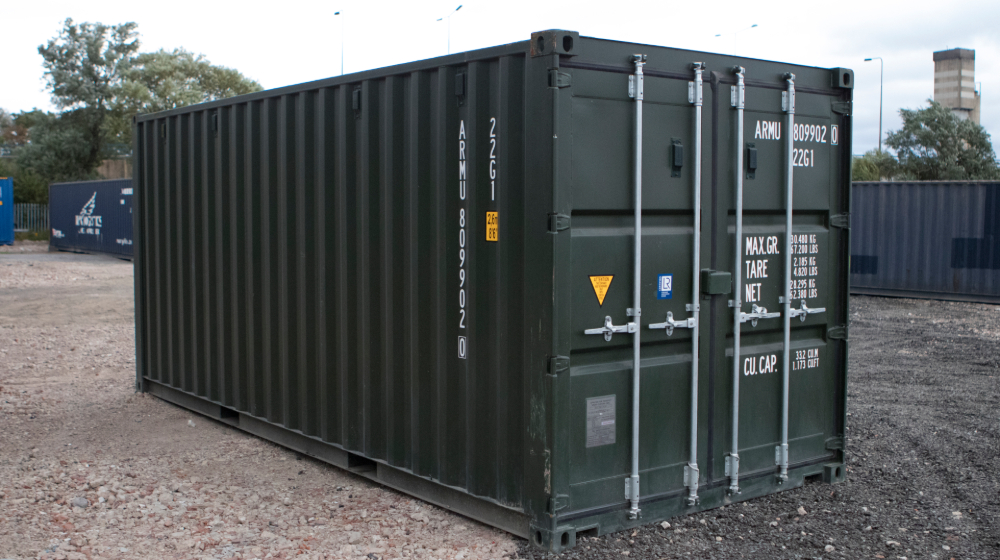5 Key Benefits When You Shop New Shipping Container 40 x 8 x 9.6 for Modern Living
5 Key Benefits When You Shop New Shipping Container 40 x 8 x 9.6 for Modern Living
Blog Article
The Ultimate Guide to Picking the Right Delivery Container for Your Demands
When it comes to picking the right shipping container, comprehending your particular needs is vital. You'll want to think about elements like dimension, kind, and product to assure you make the very best selection. From standard dimensions to specialized options, there's a lot to explore. Plus, budgeting for both the container and any kind of modifications can make a large distinction. Allow's damage down the essential aspects to help you find the perfect fit for your demands.
Understanding Delivery Container Sizes
When you're choosing a shipping container, comprehending the different dimensions offered is critical for making the right choice. Delivering containers usually come in standard sizes of 20 and 40 feet, however you'll also find various other measurements. Understanding the dimension you require relies on what you plan to shop or transport.If you're relocating smaller items, a 20-foot container could be perfect, while larger shipments typically need a 40-foot container. The height can also vary; high dice containers supply additional upright area, which can be valuable for taller goods.Before determining, determine your cargo, and think about how much space you'll need for packing and unloading. Constantly consider potential future needs-- opting for a somewhat bigger container might conserve you headache down the line. Eventually, selecting the appropriate dimension will improve efficiency and assure your items are safe during transit
Types of Shipping Containers Available
There are a number of kinds of delivery containers available, each designed for particular functions and freight requirements. The basic completely dry container is versatile, best for general freight. If you're delivering subject to spoiling items, consider a cooled container, which preserves a controlled temperature level. For large products, high cube containers supply extra height, fitting taller loads.If you need to move hefty machinery or equipment, level shelf containers provide a durable base without wall surfaces. Meanwhile, open-top containers permit very easy loading of high cargo, with a detachable tarp covering for security. If you're seeking versatility, consider a retractable container that can be easily stored when not in use.Lastly, specialized containers like tank containers are used for fluids, while vented containers are designed for bulk freight that requires ventilation. Recognizing your freight type will certainly aid you select the best container to satisfy your shipping needs effectively.
Material Considerations for Longevity
When selecting a shipping container, the material plays an important duty in its toughness. You'll wish to evaluate the advantages of steel versus aluminum, particularly regarding deterioration resistance. Understanding these factors can assist you make an extra enlightened choice for your delivery requires.
Steel vs. Light weight aluminum Containers
Just how do you choose in between steel and light weight aluminum containers for your shipping requires? Begin by considering sturdiness. Steel containers are durable and deal outstanding stamina, making them perfect for hefty lots and severe problems. They stand up to damages from effects and are often less costly, which can be a significant factor for budget-conscious buyers.On the other hand, light weight aluminum containers are lightweight, which can conserve you on delivery costs. They're easier to steer and are an excellent selection if you require to deliver goods regularly. Nevertheless, light weight aluminum is normally a lot more costly and less robust than steel. Evaluate your specific needs carefully, consisting of weight, expense, and the sort of freight you'll be shipping, to make the best option for your scenario.
Rust Resistance Elements
Picking the best material does not simply entail weight and price; rust resistance plays a significant duty in sturdiness. When selecting a shipping container, take into consideration the environment it'll encounter. Steel containers, while strong, can corrosion otherwise appropriately treated. Search for alternatives with protective finishings or galvanization to boost their lifespan. Aluminum, on the other hand, uses all-natural corrosion resistance, making it ideal for coastal locations or moist problems. However, it can be extra costly. Furthermore, examine the container's usage-- if it'll be revealed to chemicals or rough climate, focus on materials that can stand up to these conditions. Spending in a corrosion-resistant container currently can conserve you from visit this web-site pricey repair work or substitutes down the line. Pick wisely for long-lasting advantages.
Alterations and Customization Options
Shipping containers aren't just for delivering items; they can be transformed to fulfill your certain needs with numerous modifications and personalization alternatives. You can transform a typical container into a relaxing workplace, a short-term retail store, or also a personal gym. The possibilities are nearly endless.Think regarding adding windows, insulation, or ventilation to improve convenience. You may also think about electrical wiring, pipes, and even personalized shelving to improve functionality. If security's a concern, strengthened locks can offer tranquility of mind.For visual charm, you can repaint the container or add a special layout to make it attract attention. Do not forget floor covering options-- whether you desire sturdy plywood or something more sophisticated, it can elevate the space.Ultimately, tailoring your shipping container to suit your needs can enhance functionality and develop a distinct setting that reflects your style.
Examining Your Transportation Demands
When it comes to using your modified delivery container, comprehending your transportation needs is key. Beginning by identifying check out here what you'll be delivery-- whether it's hefty devices, retail items, or individual products. Each type of freight has various needs relating to size, weight, and accessibility.Next, consider the distance and mode of transport. Are you shipping in your area, nationally, or worldwide? This influences the container's layout and performance. If you're using vehicles, ensure your container fits typical dimensions for simple loading and unloading.Additionally, consider transit problems. Will your things need unique protection from climate or temperature variations? If so, you might require insulation or air flow attributes in your container.Lastly, examine exactly how frequently you'll be moving items. Constant deliveries may call for a much more durable and functional container to satisfy continuous needs. By dealing with these factors, you'll be well-prepared to pick the appropriate shipping container for your demands.
Budgeting for Your Delivery Container
Establishing an allocate your shipping container is crucial for making certain a smooth getting process. First, figure out just how much you can manage to invest. Prices can vary substantially based on dimension, condition, and type. New containers commonly set you back extra, yet made use of ones can provide significant savings.Next, consider any added prices you may sustain, such as transport charges, shipment costs, and alterations. If you intend to customize the container, factor in those costs as well. Study different providers to contrast costs and discover the very best deal that meets your needs.Don' t fail to remember to consist of any licenses or laws useful reference that might apply to your acquisition and use the container. By plainly detailing your budget plan, you'll be much better prepared to make educated choices, ensuring you get the right container without damaging the financial institution.
Maintenance and Take Care Of Longevity
To ensure your shipping container lasts for years, routine maintenance is essential. Begin by examining the exterior for rust, dents, and damage. If you find any kind of problems, address them instantly to stop more deterioration. Tidy the container periodically, both within and out, to remove dirt, debris, and moisture that can bring about corrosion.Ensure the doors seal correctly and oil the hinges to avoid corrosion and sticking. If you're utilizing the container for storage space, think about including air flow to reduce moisture and mold and mildew development. For added protection, apply a rust-inhibiting paint or sealer annually.If your container's situated in an extreme environment, like coastal locations, you may require to raise upkeep regularity. Keep an eye on the flooring, too; any type of indications of wear should be repaired today. With these easy actions, you'll extend the life of your shipping container considerably.
Often Asked Inquiries
Just how Do I Locate a Trusted Shipping Container Supplier?
To locate a dependable delivery container distributor, start by researching on the internet reviews, requesting for referrals from good friends or market contacts, and contrasting prices. Constantly examine their qualifications and warranty they use high quality containers that fulfill your demands.

Can I Rent a Shipping Container Rather Than Acquiring?
Yes, you can absolutely lease a shipping container as opposed to buying one. Many distributors supply rental alternatives, which can save you cash and give flexibility if you just require it for a short duration.
What Permits Are Required for Container Placement?

Are Delivery Containers Weatherproof and Ideal for Outdoor Storage Space?
Yes, shipping containers are normally weatherproof, made to withstand harsh conditions. Their robust building and construction maintains your items safe and secure and dry, making them suitable for outside storage. Simply ensure correct air flow to stop dampness accumulation inside.
Just how Do I Transport a Shipping Container Once Purchased?

Report this page